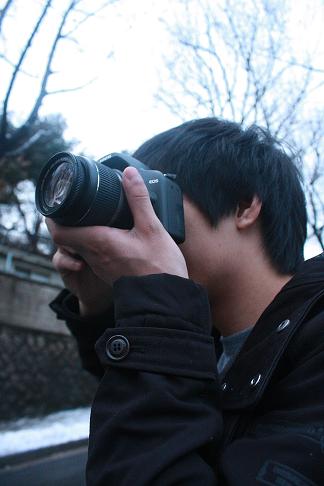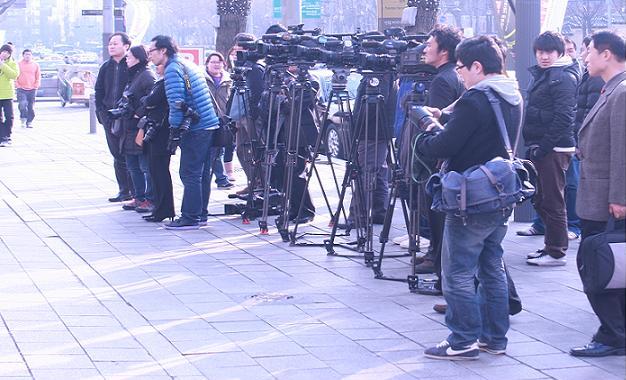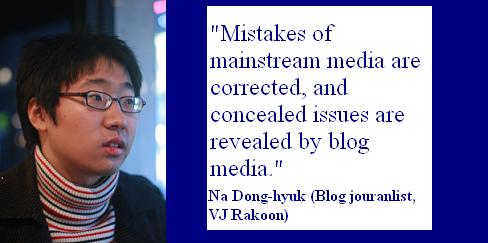covering the uncovered at the scene
 |
I AM just an ordinary citizen, but I head to where the issues are. Within a crowd of reporters, I hold up my camera and take out a notepad. I don't have a press card, yet my passion is my own press card. Standing for hours on end, covering a case, I drag my tired self home and report social issues on my blog. I see with the eyes of a citizen, and therefore explore the angles that the large media cannot. I provide netizens with the chance to encounter new issues from a different perspective, and they complete my article with replies. I barely make a living, but I write another article today because of the citizens' right to know. I am a blog journalist.
A blog journalist
There were 133 million blogs on the web as of 2008. Such widespread use of individual blogs and digital cameras was the foundation for the growth of blog journalists, and nowadays they are perceived as credible sources of news. A blog journalist is a citizen who covers social issues just like a reporter would, and discusses them on his or her blog. With blog journalism's ability to cover an issue ignored by the mainstream media, and its ability to report rapidly through the Internet, it is gaining much attention from people, and is developing day by day. In Korea, examples of blog journalists or individual media who have gained great influence are power bloggers Kim Jung-hwan, known as "Mongu", who reports on his now renowned blog "Media Mongu" with 22,382,505 total hits, and Na Dong-hyuk, also known as "VJ Rakooon," who broadcasted live on the internet during the candlelight vigils.
 |
Differences between blog media and the mainstream media
The mainstream media and blog media differ in bloggers' independence and their way of delivering and covering a subject. a blog journalist works on the article from the start to the end, so there is no gatekeeping. However, in large media, the report is edited, and what the reporter intended to convey might be censored by the editorial office. "Korea's mainstream media are very polarized into progressive and conservative groups, and the articles from these two groups tend to differ greatly in perspective," says Kwon Keun-taek (Reporter, Newsboy). Therefore if a reporter works in a left-leaning newspaper, for example, it becomes inevitable that they write from that newspaper's editorial bias. "Many reporters tell me in person that it is very stressful to have coercion from above to write in certain ways or in favor of certain groups," says Kim Jung-hwan (Blog journalist, Media Mongu). Blog journalists, on the other hand, are free from such restrictions and can write what they really believe in.
Delivery of an issue by the mainstream media is unidirectional: from the mainstream media to the readers. Readers are forced to take the given information as is, and have no chance to shape it through their opinions. Blog media are different, though, as it enables interaction between readers and the author through active posting of replies, giving readers the chance to express their opinions. "With blog journalism, the distance between the media and readers has been narrowed. Before, issues were handed down from mainstream media to the citizens; it was a vertical relationship. However, in blog journalism, there is interaction," says Na Dong-hyuk (Blog journalist, VJ Rakooon).
Furthermore, the coverage of an issue by the blog media tends to be more in-depth; therefore, they are able to fill in the gaps that mainstream media have not been able to cover. "Blog journalists can report areas and issues that the mainstream media could not reach or left out," says Son Yeong-il (Reporter, Donga Ilbo). A blog journalist expresses the reasons for this: "Oftentimes, when reporters from the mainstream media come to cover a case, they tend to leave quickly, after only observing the general situation at the scene. Many, after leaving earlier, rely on professors in forming the argument of the article. Their collection of news materials therefore tends to be superficial," says both Na and Kim. Due to such shallow coverage of events, the possibility of missing an important angle becomes higher.
Nevertheless, a blog journalist's collecting of news material is different. "When I cover an issue, I cling to the subject and stay at the event hours on end, until it finishes," says Kim. With this way of reporting, a blog journalist is often able to cover the points and incidents that large media reporters are prone to leave out. "Since blog journalists are much faster in reporting an issue and cover exclusives that mainstream media do not, nowadays, there are many instances where the mainstream media refer to the contents of blog media, producing articles that refer directly to Media Mongu," says Kwon. Therefore, this individual online media has taken on the role of an alternative news source, supplementing the shortcomings of the mainstream media.
 |
The influence of blog media on the society
Although blog media have a short history, they have produced considerable effects on society due to its completely new method of reporting. More than simply conveying events, they have given a new voice to the public. "Public sentiment tends to be created by the mainstream media rather than individuals; and since blog media can provide the public with reports from a different perspective, they can present readers with another point of view," says Kim. An example of this impact is explained by blog journalist Na Dong-hyuk. "For instance, during the candlelight vigils in 2008, the mainstream media often focused on criticizing candle wax left on the streets rather than what was really happening, whereas blog journalists reported what was really taking place," says Na. Thus, blog media balance the biased public sentiment created by the mainstream media.
Moreover, blog media have been able to improve democracy by revitalizing the participation of citizens in political and social issues, and act as the foundation for cyber democracy. The candlelight vigils that took place in 2008 were initiated by individuals using the Internet, and the blog media were at the center of this phenomenon. Reporting the protest situation as it is, and covering the scene directly through UCC, it raised awareness of the issues among the common people. "The advent of blog media has created a new space for communication, which has enabled participatory democracy. It has changed those who were indifferent to social issues, and the candlelight vigils in 2008 showed the power of blog journalism," says Son. Despite a short history, the blog media phenomenon has brought significant changes to society that no other form of media could bring.
Yet, there are also negative sides of blog journalism. As a reporter from a traditional, conservative newspaper Donga Ilbo, Son says that the largest problem of blog journalism lies in its vulnerability to subjective reporting, since there are no restrictions. "Reporting by blog journalists can easily be influenced by their own ideas. Therefore, they can become subjective, showing only what they want to show," he adds. Moreover, he questions the quality of information delivered. "Sometimes, to catch people's interest, they can focus more on covering breaking news, issues that are more exciting rather than socially important issues," says Son. Another problem in blog media is that the readers of blog journalism can tend to create extreme views among the public. "Many readers of the articles on my blog are anti-government, who are tired of biased reporting in mainstream media, and sometimes their replies can be extreme," says Kim. Therefore, such extremist netizens can promote radical opinions that may spread among the broader public.
The difficulties of blog journalists
When the blog journalist Kim Jung-hwan received Korea's 2009 blog-award in the current affairs/business field, he professed, "It is hard being a blog journalist covering current affairs." With this, he let out long-suppressed tears of hardship. As shown in his tears, many blog journalists have walked a rough and difficult road. From the very beginning, it was hard, as they were a new concept. "When I first started reporting on my own, professional reporters ignored me a lot while I was cov jering a case among them," says Kim. For many professional reporters, a blog journalist with jout a press card was a thorn in their side, thinking that they are invading their territory. Moreover, since they belong to no organization, they have nothing valid to show when they cover a case. "When police ask us what we are doing at protest scenes, we have no press cards or name cards to show them. Then, we have to spend the night in jail, which is frustrating and stressful," says Na. Furthermore, the space for blog journalism to stand in the Internet world is getting smaller and smaller due to the changes in media regulation. "The current media system is more focused on the convenience of politicians rather than ours," says Na. Without protection from the law, and facing hardships and discrimination in their daily lives, blog journalists are still struggling with a camera in their hands.
The path that should be taken
Blog journalists have been walking an unpaved road, and they say that their situation is much better than when they first started. However, where should they head to in the future? What is needed for them to take root in society? For both blog journalism and mainstream media to advance, their relationship should not be confrontational. "Blog media and mainstream media should cooperate in building a better media," says Kim. Actually, blog journalist Kim and reporter Lee Jae-guk from Kyunghyuang Daily have cooperated for a news report. Through this, they were able to complement each other, filling the gaps that each media have. "The writing in the mainstream media has a concise, accurate style and the writing of blog media has sincerity and variety. When these two are combined, the result could be very effective," says Kwon.
Moreover, for blog journalism to develop, the quality of information provided should be improved. "To gain trust from people, blog journalists should sort out fact and rumors. Furthermore, they need to cover various issues in society, and establish a brand power of their own," says Min Kyung-bae (Prof., Dept. of NGO, Kyung-hee Cyber Univ.). Trust from readers is the foundation for the improvement of blog journalism, and the foundation for trust from the readers is in accurate reporting. Blog journalists also need a sense of duty in what they are doing. "There follows a responsibility as a form of 'media'. Therefore, blog media must think of recording the contemporary era as their duty and take it seriously," says Son. With such improvements, blog journalism will not be temporary, but become a medium for a better society.
* * *
Blog journalism is bringing changes to society. It is not simply stating social issues, but expresses messages that move other's minds, affecting individuals. The path of blog journalism is rough and difficult. However, for today's press to improve while maintaining balance, the blog media need to develop together with the mainstream media, with both pride and responsibility. Today, blog journalists are still on the streets, with cameras in hand to catch the scoop that lies in the blind spot of the mainstream press. "Blog media are a broadcasting network that is a spokesman for the neglected in society," says "Mongu".

